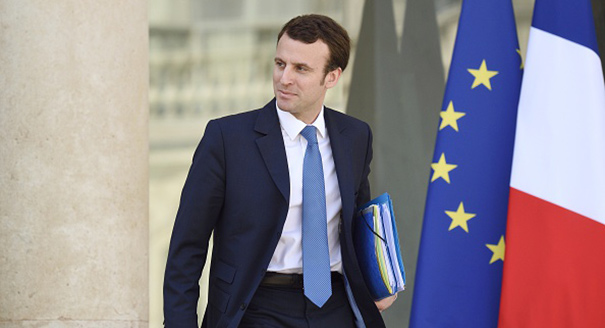Someone somewhere in France must have had a European epiphany this summer. At some point between German Chancellor Angela Merkel’s vacation and the third bailout package for Greece, somebody in President François Hollande’s inner circle decided that France needed to lead on Europe, that the German silence over Europe’s future offered a great chance for Paris, and that a bold plan for Europe might be the only tool to unlock the stalemate on economic reform back home.
The timing could not have been better. Over the preceding months, a banal truth long rejected by European leaders had gained traction in the debate over the EU’s future: the fact that if the members of the eurozone wanted the single currency to survive, they would be forced to integrate much more deeply politically as well. It was becoming clear that Europe couldn’t have deep economic integration without also embracing a commensurate level of political integration. And the moment at which the blatant imbalance between the two would lead to crunch time was very near.
First, Macron briefed Germany’s top diplomats at their annual conference in Berlin on August 25 about the necessity of more integration in the eurozone, a message he repeated for a broader audience in Germany’s Süddeutsche Zeitung on August 31. Then, Cœuré gave a speech on August 27 during ambassadors’ week in Paris, making the exact same points.
Their bottom line was clear: what the euro needs to survive is, on the one hand, solidarity between strong and weak members and, on the other hand, fiscal discipline and structural economic reform from everybody. Macron made it plain that a fiscal union without some sort of transfer system was unthinkable, something sure to ruffle feathers in Berlin. But he also, though less concretely, admitted that the French would have to say good-bye to many of their own firmly held beliefs.
In principle, this initiative is exactly what Europe needs. Its value is manifold. It is outspoken about the core contradictions of the euro’s design, a clarity that is rare from leading politicians, even these days. And it adopts the central principle of Berlin’s approach to the eurozone: that the reverse side of solidarity is fiscal responsibility, which is an equally important commonplace that can’t be repeated often enough.
Also, it is especially significant that this message comes from France, a country where market-oriented economic reforms and sound budgeting are brutally tough to implement, and where anti-liberal and anti-capitalist sentiments are de rigueur among large parts of the population.
#France's new #eurozone initiative is exactly what Europe needs.Tweet This
Macron and Cœuré are aware of the fact that they are asking for a political revolution in Europe, and so, to make it all a bit less science fiction, they wrap everything in a fairly conventional political dress. Acknowledging that their proposed great leap forward would require stronger democratic legitimacy than the current system, their response is as traditional as it gets: Europe is all about output legitimacy, about the great things the EU produces for its citizens, such as jobs, growth, and social protection. And if the EU does all of that, citizens will buy into reforms as bold as these.
What the two men don’t mention is that a more integrated Europe will also need more input legitimacy, meaning more participation by EU citizens in Brussels politics, ideally through pan-European elections. Macron and Cœuré seem to believe that this need can be fulfilled by the European Parliament, an institution that has been notoriously unable to address the EU’s democratic deficit in the past twenty years. This won’t do, and it is a big weakness of their plan.
They are also vague about the competences of their proposed eurozone finance minister. Macron states in the Süddeutsche Zeitung that the holder of this new post should have not only access to a considerable budget but also a say in the allocation of European investment funds and job policies.
It is this last point that makes alarm bells go off among more liberally minded observers. Doesn’t this sound exactly like the old dreams of French gouvernement économique, complete with deficit spending, state-sponsored growth programs, and just enough dirigisme to all but ensure the failure of well-intentioned policies? Isn’t this just another attempt to make more French an EU that had become more Anglo-Saxon over the years?
No doubt there is a strong strategic element in the French initiative. This is the once-in-a-lifetime opportunity for French leaders to shape the EU’s economic governance the French way—this time without any interference or opposition from the unruly, market-oriented, globalization-embracing British, who are not in the eurozone.
That the French inserted old hobbyhorses into a major reform plan is unfortunate.Tweet This
This part of the Macron-Cœuré plan needs to be approached with great caution and, if needed, fiercely rejected. The fact that the French were unable to resist the temptation to insert their old hobbyhorses into a reform plan of revolutionary scope is rather unfortunate.
And yet, the core of the proposal has great value and needs to be studied carefully. It contains some of the key elements of what the eurozone—and, at some point, the EU—will have to look like.
Like it or not, France has exercised some significant leadership in the debate over the future of the EU. Paris has the advantage of having shaped that debate. Everyone else now has to take Macron’s ideas into account. The momentum for change in the EU is growing. Merkel, British Prime Minister David Cameron, and all other EU leaders must step up and present their own proposals. They owe it to all Europeans. And they owe it to their French friends, too.



.png)




